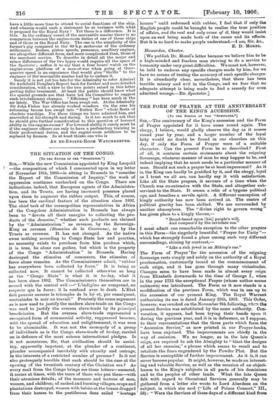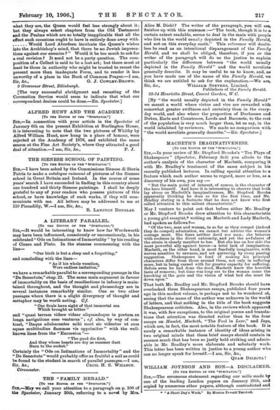THE FORM OF PRAYER AT THE ANNIVERSARY OF THE KING'S
ACCESSION.
LTO THE EDITOR OF THY "SPECTATOR."J SIR,—The anniversary of the King's accession and the Form of Prayer appointed for it have come round again. The clergy, I believe, would gladly observe the day as it comes round year by year, and a larger number of the•' loyal laity would no doubt be found in our churches on this day, if only the Form of Prayer were of a suitable character. Can the present Form be so described ? First of all, it contains certain statements about the reigning Sovereign, whatever manner of man he may happen to be, and indeed implying that he must needs be a particular manner of man. Should not such a prayer be at least impersonal P As it is, the King can hardly be gratified by it, and the clergy,• loyal as I trust we all are, can hardly say it with satisfaction. Like all the State prayers, it savours of a time when the Church was co-extensive with the State, and altogether sub- servient to the State. It seems a relic of a bygone political age, and breathes a servile spirit. A different conception of kingly authority has now been arrived at. The centre of political gravity has been shifted. We are surrounded by another atmosphere. The " divine right to govern wrong ' has given place to a kingly throne,— " Broad-based upon [his] people's will,
And compass'd by the inviolate sea."
I must admit one remarkable exception to the other prayers in this Form—the singularly beautiful "Prayer for Unity "— which has strangely found a place among such very different surroundings, shining by contrast,—
" Like a rich jewel in an .thiop's ear."
The Form of Prayer for the accession of the reigning Sovereign rests simply and solely on the authority of a Royal proclamation, customarily issued at the commencement of each reign, and it has gone through many vicissitudes. Changes seem to have been made in almost every reign from Elizabeth downwards to the time of George I., when in the year 1715 the exceptional Prayer (whose author seems unknown) was introduced. The Form as it now stands is a modification of the previous Form, which was in use up to the accession of our present King. The Royal Warrant authorising its use is dated January 29th, 1901. This Order, however, was revoked on the November 9th followingovhcn the present Service was substituted by the same authority. Con. vocation, it appears, had been trying their hands upon it during the vrevious year, and it is in deference, as I suppose, to their representations that the three parts which form the "Accession Service," as now printed in our Prayer-books,' have been enjoined. The improvements are chiefly in the way of omission. We no longer, as in the late Queen's reign, are required to ask the Almighty to " blast the designs of all her enemies," a phrase which seems to recall and to retaliate the fears engendered by the Powder Plot. But the Service is susceptible of further improvement. As it is, it can never become popular. It might, however, be made an interest- ing and valuable Service, as well as the occasion of an object.. lesson to the King's subjects in all parts of his dominions and to the peoples of other lands. What the late. Queen felt with regard to Occasional Services generally may be gathered from a letter she wrote to Lord Aberdeen on the subject, in which she said (" Life of Prince Consort," HI., 59) : " Were the Services of these days of a different kind from
what they are, the Queen would feel less strongly about it ; but they always select chapters from the Old Testament and the Psalms which are so totally inapplicable that all the effect such occasions ought to have is entirely done away with.
Would Lord Aberdeen inculcate the Queen's wishes into the Archbishop's mind, that there be no Jewish impreca- tions against our enemies ? " Would it be too much to ask for a real revision P It need not be a party question. The com- position of a Collect is said to be a lost art; but there must at least be those in authority who might be trusted to recast the present more than inadequate Form, and to render it less unworthy of a place in the Book of Common Prayer.—I am,
Sir, &c., G. J. COWLEY-BROWN. 9 Grosvenor Street, Edinburgh.
[The very successful abridgment and recasting of the Coronation Service would seem to indicate that what our correspondent desires could be done.—ED. Spectator.]











































 Previous page
Previous page